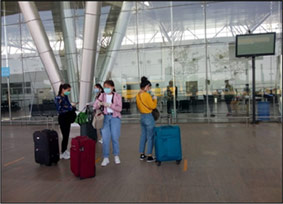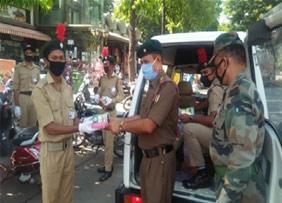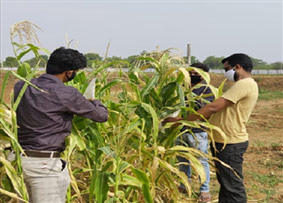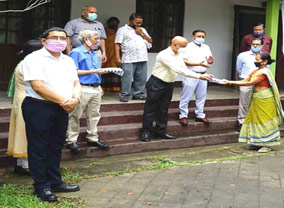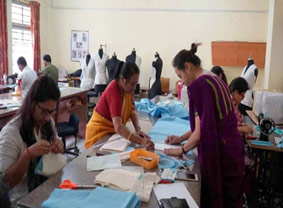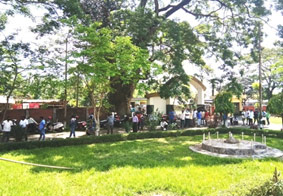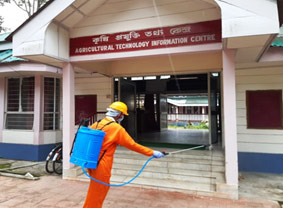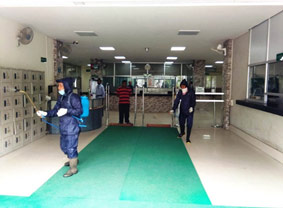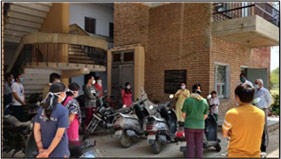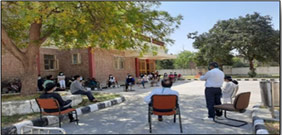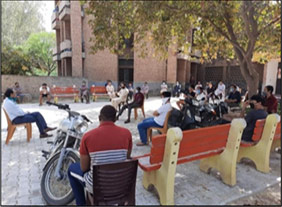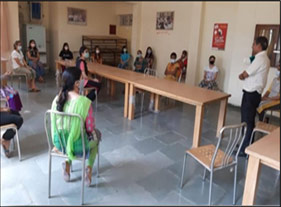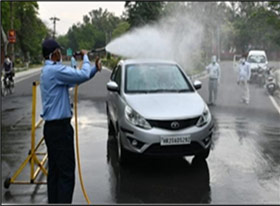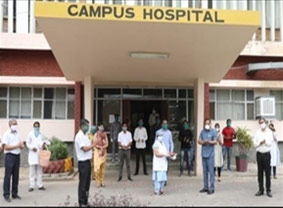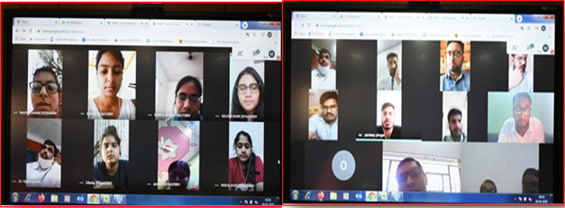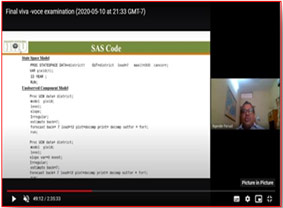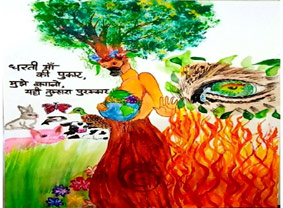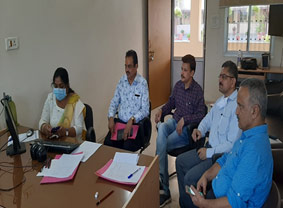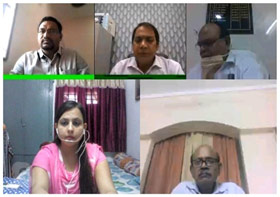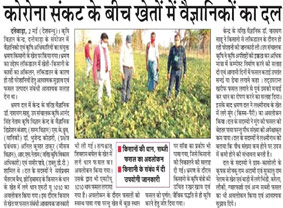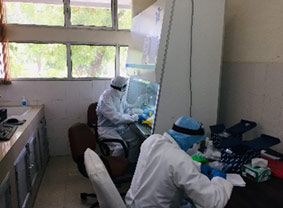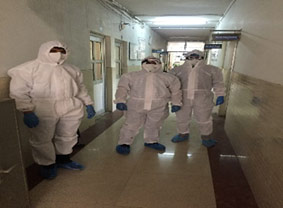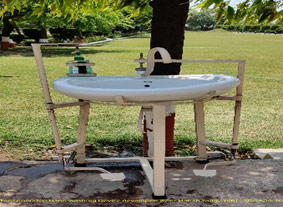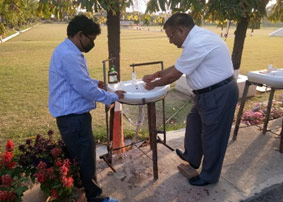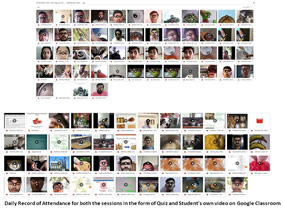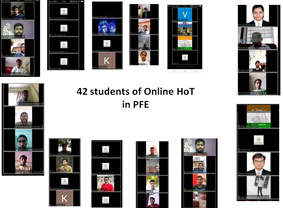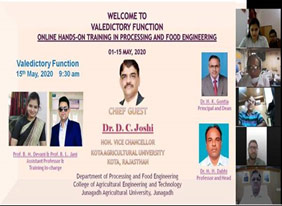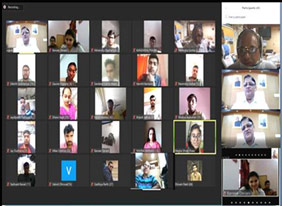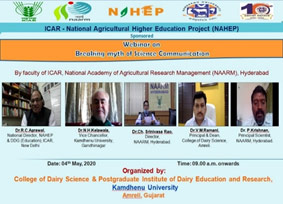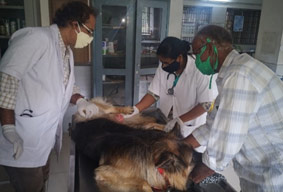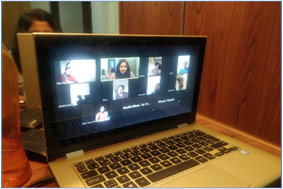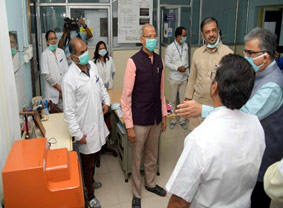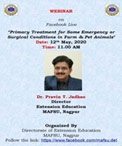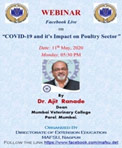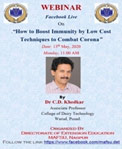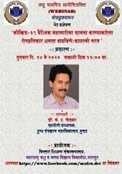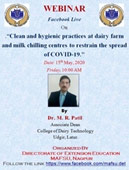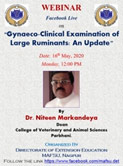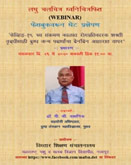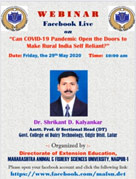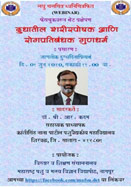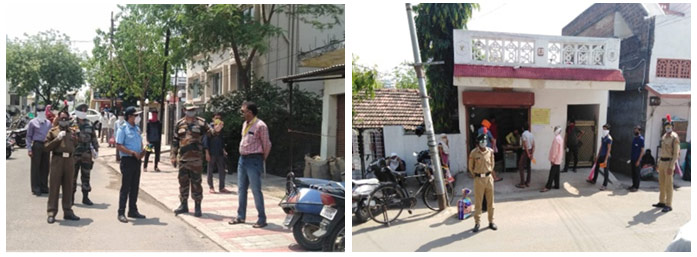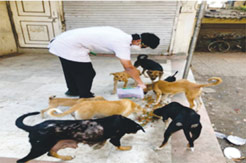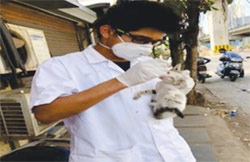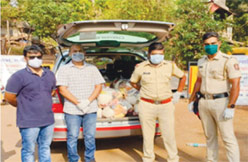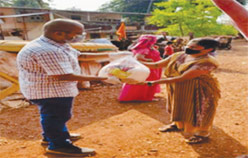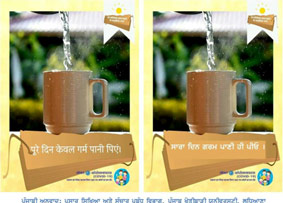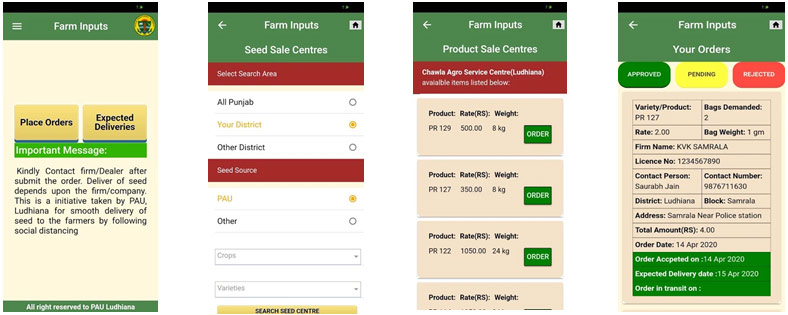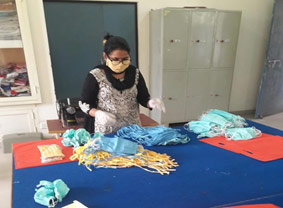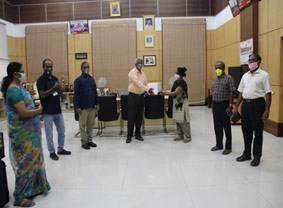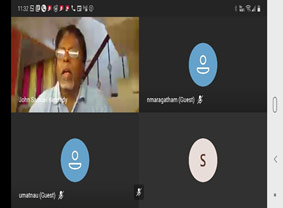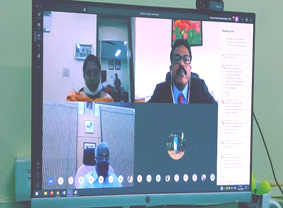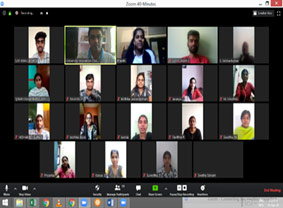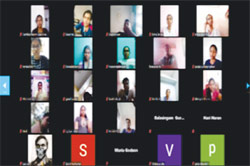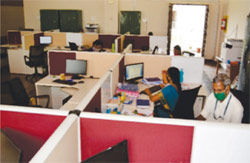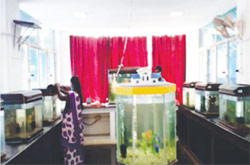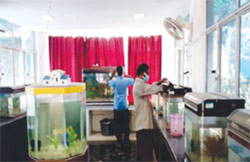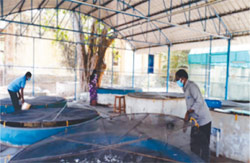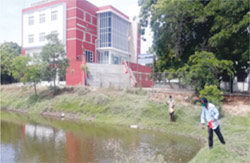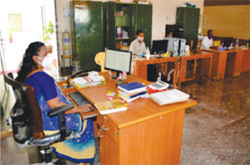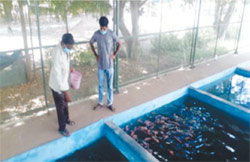
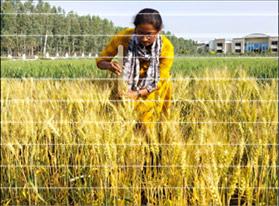 Woman in the field
Teachers of the institute developed course materials and presentations to communicate the subject materials to students. The university’s established internet connectivity helped a lot during the process. Professors and other faculty took initiative and even conducted lectures from their home, owing to lockdown situations. The dedication of faculty was to uphold the standards the institute has established. The faculty distributed the recorded lectures and other audio-visual materials by various means of communication. Even social media was used for ensuring continued education. While teaching the students, teachers have tried to get the feedback and address queries of students to satisfy their concerns.
All the teaching materials were compiled for different semesters and were shared through following link.
|
The foreign students staying at International Hostel (ICAR funded) were given all the necessary support during lockdown period with parental care by the Dean, Warden and University Officers.
Research Activities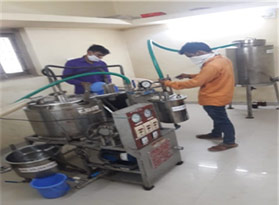 Scientists on duty
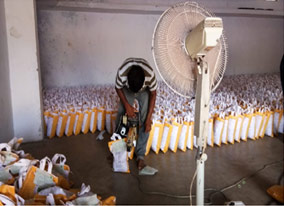 Material being packed
In this difficult time the Veterinary Clinical Complex remained committed to the animals. Extraordinary efforts were put for affirming the continued health service to animals. Cases of pet animals are frequently being referred to the hospital from all over the Gujarat as well as neighboring states. During this lockdown, the Veterinary Clinical Complex has worked with authorities and ensured pet owners the same quality of treatment they expected from the hospital. While many of the animals could not be brought to the hospital, over-the-phone assistance was provided, including the safety and hygiene measures to be taken during this time.
|
|
During this lockdown, the Veterinary Clinical Complex treated more than 540 cases including 403 dogs, 14 horses, 51 goats, 15 birds and dozens of other species of animals. More than 25 surgical operations were performed in emergencies. The media also took note of this. Personal Protective Equipment (PPE) kits were provided to the Doctors working at the Veterinary Clinical Complex to ensure their safety during their duty.
Livestock Research Station (LRS) of AAU maintains 340+ cattle. With efficient management and support from whole staff of LRS the farm has not observed any side-effects of lockdown on farm routine. During the lockdown the various farm activities like FMD vaccination of 300 animals, deworming of 300 animals, artificial insemination of 42 animals and calving of 15 animals were attended. The milk production increased by 13.47 percent during lockdown period and more than 700 vermi-compost bags were supplied to university farms.
Livestock farm complex is the heart of institute. The establishment serves as a place for research, trying new technologies, carrying out nutritional requirement calculations and besides all this, serves as a model livestock farm in the country which possesses more than 250 cattle and buffaloes, more than 100 sheep and goats, about a dozen laboratory animals and 2 horses. Providing all these animals regular feed and water and take care of their health is one of the primary tasks of the farm managers. To manage about 400 animals is a challenging job, with lockdown imposed. The workers were less in number due to transport restrictions, feed and fodder could not be managed which was being transported from external sources. In this situation, scientists and manager of the farm took up the task to manage the farm as efficiently as in normal situation, with the limited resources they had available. LFC’s large source of income is selling of milk, and that has been managed efficiently.
Essential activities were carried out at the Poultry Research Station during the period of lockdown. Initially, hatching of eggs already loaded in incubator was carried out and the hatched chicks were sold. Routine vaccinations and medication were done. Feeding, watering as well as cleaning and disinfection of poultry houses were carried out. Daily collection of eggs and appropriate storage of eggs were done. Selling of eggs was also done. Sprinkling of water in the sheds and on the birds along with cold water supply to birds were carried out due to hot environment. Purchase of poultry feed ingredients and manufacturing of various poultry feeds for the research station were carried out.
|
Hostel (UG/PG/International)
Sanitization Drive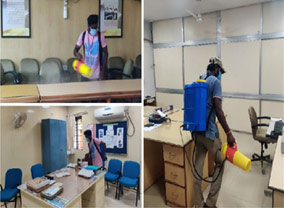 Material being packed
Appreciation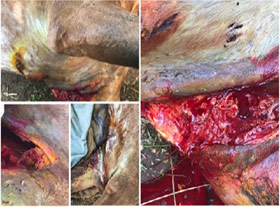 Corona warriors work appreciated
|
Humanitarian Services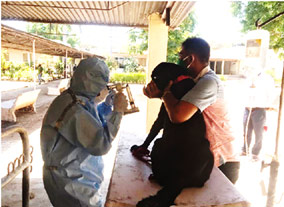 Dogs clinic open to service
Students' Whereabouts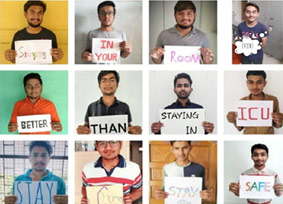 Students in constent touch
Administration and Management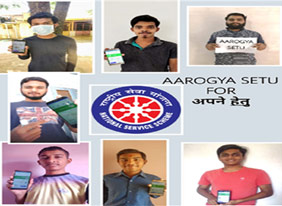 Students in constent touch
National Service SchemeThe NSS volunteers of the College of Veterinary Science and Animal Husbandry actively participated in various activities during this lockdown period like iGOT learning module registrations, Arogya Setu application and Preparation of Media for COVID-19 Outbreak Awareness. Poster as well as essay writing competitions were held to pay tribute to the selfless corona warriors. Exercise “Yogdan” was organized for COVID-19by NCC in Anand during April and May2020. The students of the CAET, Godhra, actively participated in various activities as well during this period.
They have registered and participated on the iGOT online platform along with the NSS officer and received training related to COVID-19. They have also prepared a motivational video on COVID-19 to boost the moral and helped people to boost up their fight against COVID-19 by posting it on several social media platforms. Students also participated in online awareness campaign through Quiz organized by Sigma Institute of Engineering, Bakrol, Vadodara and received an E-certificate of the same.
|
Celebration of World Milk DaySMC College of Dairy Science and its Alumni Association organized Slogan writing and Cartoon making contests to celebrate 20th World Milk Day on 1 June 2020. Slogans (19) and cartoons (25) were received from present students and alumni of the college. These entries were evaluated by a panel of eminent referees.
World Veterinary Day CelebrationOn 25th April, the institute celebrated World Veterinary Day by arranging seminars, lectures, competitions and events every year. This year however, students of the institute showed their best by showing their technological prowess. They took this challenging time, to form a quiz that can help refresh the knowledge of the veterinarians. They made it available to public. More than 1,200 people took the quiz.
Muqabala-e-innovation CompetitionDr Krupa Ramani, Alumni of SMC College of Dairy Science, won the First Position in Muqabala-e-innovation Competition organized by NDDB, Anand on the celebration of World Milk day on 1st June 2020. She developed “Lasgna dessert” recipe in this competition.
Celebration of World Environment dayThe final year students (B.Tech.DT) contributed to celebration of world environment. They planted trees at home and shared the photo with Vidya Dairy, where tree plantation work is done every year.
Poster Making Competition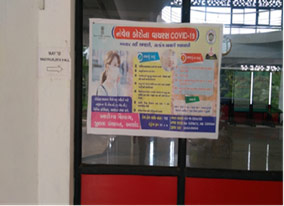 Best poster award earned
Essay CompetitionDr Subrota Hati, Assistant Professor, Dairy Microbiology Department, SMC College of Dairy Science, Anand won the Essay Writing Competition Award (Third Position) on "Food Safety and Hygiene during COVID-19 Pandemic" Jointly organised by IDA- Eastern UP Chapter and Department of Dairy Science & Food Technology, Institute of Agricultural Sciences, Banaras Hindu University, Varanasi during 15-16May 2020.
Social ServicesThe university has given entire guest house of more than 100 bedding capacity to the district administration, which was used as a quarantine facility center for the suspects of COVID-19. The college of Agricultural Engineering and Technology has played an active role in fighting the pandemic by extending support to the local administration by providing the 280student capacity hostel for creating a district level quarantine center.
Further, AAU officers, teachers and staff also extended one day salary in CM relief Fund (for COVID-19), Government of Gujarat Rs2,131,270and retired pensioner faculties also extended support of Rs 6, 93,000.
|
|
Vice-Chancellor of Prof. K.P. Singh said that the suggestions have been given keeping in mind the daily agricultural operations and are also available on the university’s website. In this regard, the university always welcomes suggestions given by scientists, officers, progressive farmers and health department experts. Farmers are also requested to follow the guidelines issued by the government.
VC Interacts with University Officials through Video ConferencingThe Vice-Chancellor, Prof. K.P. Singh communicated with all University Officials including OSD, Registrar, SMO, administration of the University Hospital etc. via video conferencing on education, research, extension education and other activities. Prof. K.P Singh instructed Dean, College of Basic sciences and Humanities and Dean, College of Agricultural Engineering and Technology to provide students with sufficient online study material to continue with uninterrupted studies.
Prof. K P Singh also interacted with Director Extension Education, Director of Research from University Farm, KVKs and all other concerned controlling officers and instructed that the crops shall be collected by machines, and if needed, by the labour force, given that the administration permits and all other policy guidelines are followed.
The Director of Research, Director Human Resource Management, Directorate of Student Welfare, and SMO, University Hospital were advised to send guidelines and directions to all the students, scientists and other officials who have travelled abroad to obey the requisite guidelines on arrival in the country.
He also advised the Dean, College of Home Science to produce masks for the workers and employees engaged in security, mess and cleaning work. The officers were further advised to obey the directives issued by the Government of India and Government of Haryana and also to direct all co-workers to follow the same.
Discussing further, Prof K P Singh instructed that vegetable produced by Den Dayal Upadhyay Organic Farming Center will be sent to market and sold at a reasonable rate.
Prof. K.P. Singh ensured the health of all employees, officers and comptroller was directed to monitor contract workers including timely payment of salaries.
Free Masks for Families Residing in the University Campus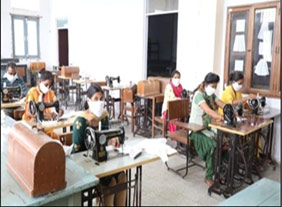 Girls Student making Masks
|
University Vice-Chancellor Prof. K.P. Singh said “It is our responsibility to help one-another explicitly during this sensitive time and to provide every possible help. The religion of humanity is the greatest of all and it is for all of us to protect it”.
In addition to this he assured the students for providing education material through online web portal and online channels and help them face challenges. He also urged to follow the advisory issued by the Government of India and the Government of Haryana.
Free Cotton Cloth Material Distributed for Making MasksSaina Nehwal Agricultural Technology Training and Education Institute (SNATT&EI) of CCS HAU and Aryan Education Society, Haryana Skill Development Mission (AESHSDM) jointly made 1000 masks to protect and prevent infection of COVID-19 and distributed to Sarpanch/Anganwadi personnel/PHC/Guards and Policemen of nearby villages.
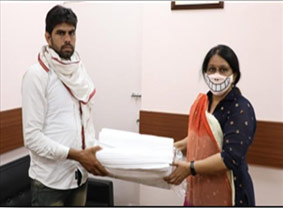 SNATT&EI and AESHSDM with Mask
Material Agricultural Officers’ Workshop through Video Conference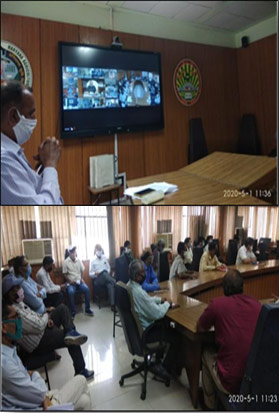 Presentation through Video Conference
Department of Agriculture & Farmers’ Welfare, Government of Haryana, Head of the Departments and scientists of CCS HAU including KVKs, and officers of the line Department of Agriculture & Farmers’ Welfare, Haryana were present at their respective district headquarters to interact and make presentations through video conference at NIC center. The Director General of Agriculture & Farmers’ Welfare, Government of Haryana, Sh. Vijay Singh Dahiya, presided over the function.
|
VC Appealed to Download App Arogya SetuProf. K.P. Singh, Vice-Chancellor, CCS HAU, Hisar informed that a mobile app called Arogya Setuhas been developed by the National Informatics Center, Government of India. It is a Bluetooth and location based COVID-19 tracker. Arogya Setuis a Sanskrit language meaning 'a bridge of health'.
Vice-Chancellor of CCS HAU, Prof. K.P. Singh has asked all the officers/teachers/scientists/staff/students working in the university that as per the instructions of the Government of India and Haryana all the families of the university compulsorily should download the Arogya Setu app on their mobile and others. Prof. Singh said that the aim of the Arogya Setu App is to enhance the initiative of the Department of Health especially by the Government of India and to provide users of this app with information related to the risks, best practice and relevant advice pertaining to COVID-19 continuously. Motivate people to download this app so that they too can get the latest information related to the risk of corona virus infection.
Cultural, Literary and Artistic Activities Amid COVID- 19Under the leadership and qualified guidance of Prof. K.P. Singh, Vice Chancellor of CCS HAU, online competitions are being organized in different departments of the university so that during this period of lockdown, the students can retain their talents by promoting educational and cultural activities. The Directorate of Students’ Welfare continues to work for the all-round development of the students. Prof. Singh elaborated that during this difficult time of lockdown, every effort is being made to maintain the normal functioning of the students. The singing and dance competitions are being organized by the faculty of Department of Music and Drama while others have been given the responsibility of Literary Fest 2020 and conducting photography and poster making competitions.
University Contributed Rs 1 crore for Corona Relief Fund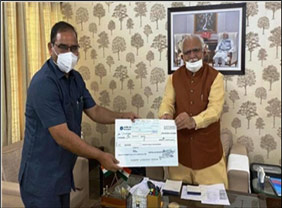 Mr. Manohar Lal presented with a cheque
of Rs. One Crore by VC CCS HAU, Hisar |
New Ideas in Agri Business - Startup Guru Suggested MantraIn view of the seriousness of the lockdown due toCOVID-19, CCS HAU Vice-Chancellor Prof. K.P. Singh is constantly promoting online workshops and webinars. It is to be known that Agri Startups connecting with Agribusiness Incubation Center (ABIC) is giving new dimensions to its business. He called upon the students and farmers that they can start their new startups in the agricultural sector by joining ABIC so that the young entrepreneurs do not restrict their entrepreneurship but instead promote and spread it more and more in their areas. This type of webinar proves to be employment-oriented and successful for all youth and entrepreneurs.
The Agribusiness Incubation Center set up at HAU is constantly conducting webinars as per the guidelines of the Vice-Chancellor, the recently held webinar on 2-3May 2020 was hosted by eminent Startup Guru Abhishek Tripathi and Business Manager Vikram Sindhu, Finance Manager Manisha Mani, and Customer Care Manager Twinkle Mangal managed it. As the keynote speaker, Startup Guru Tripathi gave the first mantra that no business can be started without thinking and how these ideas originate and transform into business, these points were discussed in a key way. He also told the participants how to prepare business proposal and important points to be kept in view while presenting it before Investor and Agribusiness Incubation Center. He shared many new ideas related to the agri business with the participants. In this webinar, about 200 farmers, young fellows and students along with Nodal Officer of Agribusiness Incubation Center and the entire team of incubation participated in this webinar.
A Touchless Liquid Soap and Water Distributor System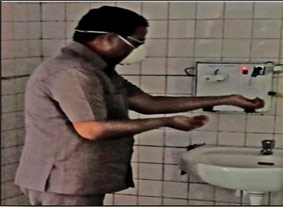 Prof. K.P. Singh VC CCS HAU using
the System Spraying Sanitizeron Vehicles/Offices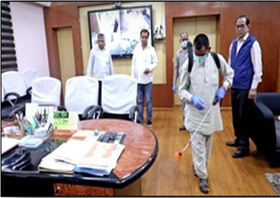 Sanitization in office
|
National On-Line Poster Competition Doctor's make up
Online Teaching of Students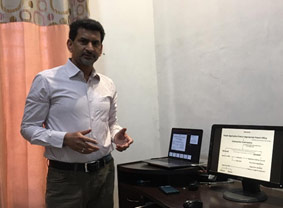 Online Teaching
Regular Supply Chain of Livestock Products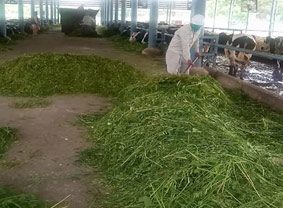 Feeding Yard Look
|
The workers were well educated about the prevention of disease and are maintaining hygiene and social distancing. They were provided with face masks, and soaps for frequent washing of hands. The faculty contributed money to support the farm-workers. The workers were served with tea at the workplace, and those residing at the farm were served food. Besides, ration packs comprising wheat flour, rice, sugar, tea leaves, oil, salt, spices, pulses, etc. were distributed among the farm-workers to support the food requirements of their family during these difficult times.
War against COVID-19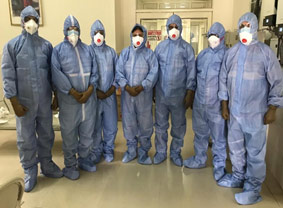 Covid-19 warriors
Print and Electronic Media during LockdownDuring lockdown and curfew condition, it was difficult to send authenticated and expert message to the farming fraternity of state, so in this crisis time, print and electronic media were helpful to serve the call. Through print media university spread its messages of online teaching, emergency services and important tips to livestock farmers along with electronic media effectively. Articles entitled ‘Dairy sector conundrum’ and ‘Preparation for pandemic situation’ were overwhelmingly carried by national dailies i.e. The Tribune and The Indian Express. Through electronic media university served all the technical needs of farmers. Fourstations of All India Radio situated in the state accepted the proposal of university to disseminate the expert recommendations through them. All India Radio stations of Jalandhar, Ludhiana, Bathinda and Patiala broadcasted more than 30 telephonic interviews of GADVASU experts on different subjects. WhatsApp and Text messages were sent twice to thrice weekly depending upon the need. Telephonic consultancy was also provided and material was also uploaded on University website in local language for better understanding. Ambassador farmers were also involved for reaching to rural farmers. Even online farmers meetings were also conducted. Farmers’ birds were also processed for deep freezing to be marketed later on when market seems promising. So it was a blend of electronic, print, personnel and PPP mode usage to provide relief to livestock, poultry and fish farmers.
Cost-Effective Hand Sanitizer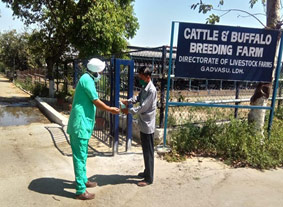 Use of sanitizer
|
|
students are undergoing their in-plant training. In M.Tech (Agril. Engg.) and Ph.D. programme total 32 courses were taught online by college faculty. In nut cell the under graduate and post graduate including Ph.D. programmes were continued online using Internet facilities during COVID-19 and students will be utilizing their time at home and their academic session may not be delayed.
College of Veterinary Science & Animal Husbandry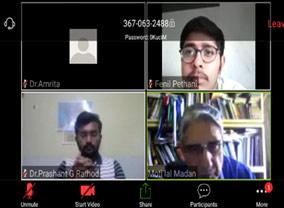 Dr. M L Madan
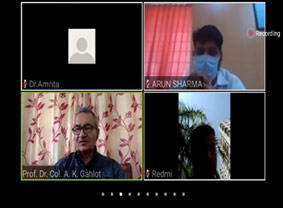 Dr. A K Gahlot
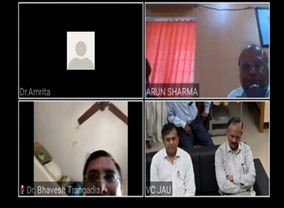 VC and Registrar
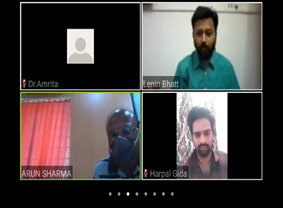 Dr. Lenin Bhatt
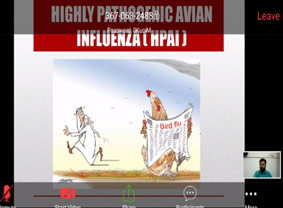 |
College of Fisheries Science,VeravalThe College of Fisheries Science, JAU, Veraval under the flagship programme of NAHEP-IDP for JAU organized Virtual Training programme on “Emerging trends and multidimensional strategies for sustainable fisheries sector in post-COVID-19 era”from 09 April 2020 to 02 May 2020.Eminent experts conducted 26 lectures on different topic through the ZOOM App. This training programme was intended to generate awareness among the UG students of second, fourth and sixth semester B.F.Sc. about the current
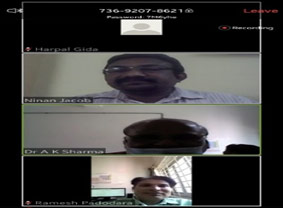 Dr. Ninan Jacob
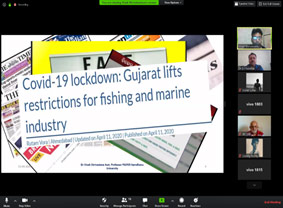 Virtual training organized
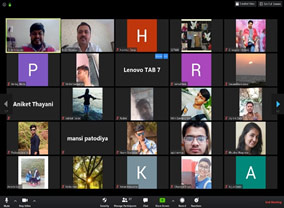 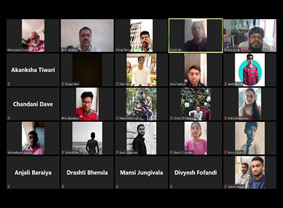 organizedsituation of fisheries under COVID-19 and future strategies for further course of action in development of fisheries including aquaculture, fisheries resource management and fish processing technology in the post-COVID-19 era. B.F.Sc. students of second (73 nos.), fourth (54 nos.) and sixth semester (49 nos.) with requisite social and gender considerations attended this training programme.
Student Competitions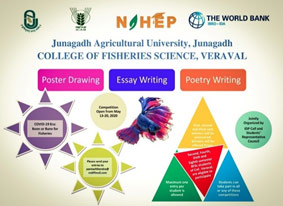 Poster drawing competition organized
Challenges, Opportunities and Future of Indian FisheriesIDP Cell of College of Fisheries Science, JAU, Veraval, is organizing three day National Webinar on “Challenges, Opportunities and the Future of Indian Fisheries Post COVID-19 Era” from 28 May 2020 to 30 May 2020.The webinar was planned to get the benefit of expert views of the eminent personalities of fisheries sector on a single platform for our UG students of all four semesters.
|
|
Expert Faculty members of Colleges also participated as experts/ panelist in various online webinars organized by various associations like World Veterinary Poultry Association (India), USA Poultry and Egg Export Council and United Soybean Board, Agro-vision Foundation, New Delhi etc. on various important topics like Myths about poultry,Eating Right with Poultry,Impact of COVID19 on Poultry Sector and road ahead,First aid and treatment in birds,Basics of aquarium set-up,Opportunities for vets in Armed Forces, etc.
|
Basics of Small Animal Laparoscopy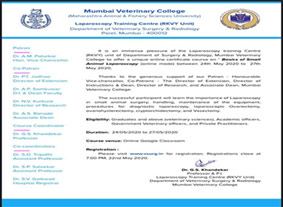 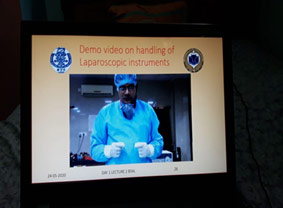 Screenshots of online training
programme Activities By Constituent Colleges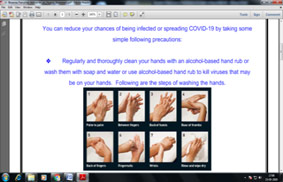 Hand washing practice in display
|
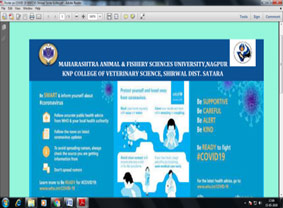 Poster display
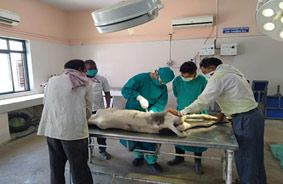 Animal operation on in clinic
|
|
The webinars were moderated by Mr S. Dinesh Kumar, E-YUVA Co-ordinator, Dr R. Rajkumar, M/s. Cellzyme Biotech Pvt. Ltd., Coimbatore, Dr K. Viveka, Innovator, Graduate Research Innovation Program, National University of Singapore, Mr Vijayanand, Assistant General Manager, Macrogen Inc. South Korea, Dr Ramjee Pallela, Chief Operating Officer, Atal Incubation Centre, Centre for Cellular and Molecular Biology, Hyderabad and Dr K. V. Satyanarayana, Associate Vice-President, Sathguru Management Consultants, Hyderabad.
Career Guidance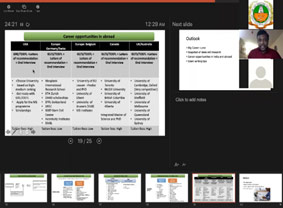 Webinar Series on Career Guidance
conducted at TNAU Dr S. Rangarajan, Post-Doctoral Research Fellow, McEwen Stem Cell Institute, University Health Network, Toronto, Canada shared his research on Stem cell therapy for Type-I Diabetes and various opportunities for pursuing education abroad and provided tips for writing proposals for securing international grants.
Yet another Webinar with a focus on Business Opportunity Identification and commercialization was jointly organized by E-YUVA and Directorate of Agribusiness Development, TNAU during 22-29 April2020 for the benefit of 65 B. Tech. (Food Technology) students. Different thematic areas such as Business opportunities in food processing, Business opportunity analysis, Mind motivational entrepreneurship, Idea to PoC & approaching grants at early stage, Government support system for food business management, An overview on FSSAI rules and regulations and business model canvas were elaborately deliberated by Dr B. Shridar, Dean (Agrl. Engg.), Agricultural Engineering College and Research Institute, Dr S.D. Sivakumar, Director, Agri Business Development, Dr Ravi Kumar Theodore, Professor & Head, Training Division, DEE, Mr Vijay Nadiminti, COO, a-idea, NAARM, Hyderabad, Mr Deepak Rajmohan, Founder & CEO, Green Pod Labs, Chennai, Mr A.V. Gnanasambandam, CEO, ABIS, DABD, MrSurendran, Technical Officer, FSSAI Regional Office, Chennai, Mr P. Sivakumar, CEO, MABIF and Mr S. Dinesh Kumar, E-YUVA coordinator.
|
Endowment Lecture OnlineCircumventing the crisis of COVID-19 pandemic, the 15th lecture in series Breeding rice varieties for salt-tolerance was delivered online on 17.04.2020 by Dr Rakesh Kumar Singh, Program Leader and Principal Scientist (Plant Breeding), Crop Diversification and Genetics Section, International Centre for Biosaline Agriculture (ICBA), Dubai using Microsoft Teams platform. Faculty members of TNAU and 367 Post Graduate students participated. Dr S. Geetha, Director, Centre for Plant Breeding and Genetics, welcomed the online gathering. DrJ.S.Kennedy, Dean, School of Post Graduate Studies delivered the introductory remarks.
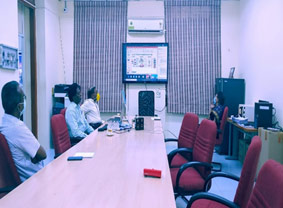 Endowment Lecture conducted online
Multi-location Audio Conference Programme by KVKMulti-location Audio conference programme was organized by KVK, Vamban, Pudukkottai with Reliance foundation on 06.05.2020. Dr M.R. Latha, Programme Coordinator, KVK, Vamban briefed about the FPG technically supported by KVK and urged the farmers for group formation to avail the benefits of various schemes. Mrs S. Jayashree, DDM, NABARD, Pudukkottai gave the steps for formation of FPOs and schemes operated by Central and State Governments through banking sectors. Thiru R.M. Sivakumar, Deputy Director (Marketing) shared the information on the activities of FPO, storage facilities for agricultural produce during the lockdown period.
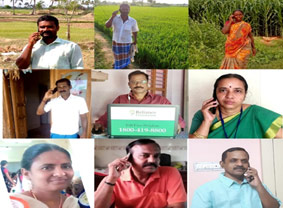 Multi-location Audio conference
programme Anchored Initiatives to Overcome Corona CrisisTamil Nadu Agricultural University, Coimbatore, a quintessence of excellence in Agricultural Education and Research, came forward to provide multifaceted support to the government and farmers to smoothly sail through corona quandary. Dr N.Kumar, Vice-Chancellor, Tamil
|
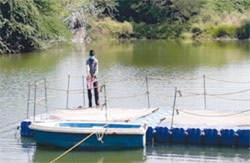 Feeding in Cage Farming at FC & RI,
Thoothukudi 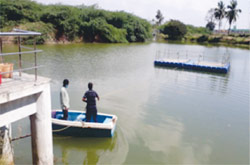 Cage Farming Activities at FC & RI,
Thoothukudi 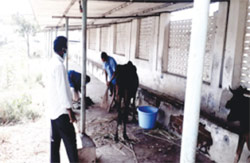 Maintaining Cattle at FC & RI,
Thoothukudi 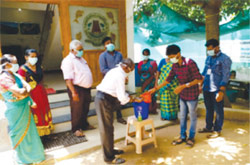 Use of Sanitizer at FC & RI, Mayiladi
situations especially in case of perishable fruits and vegetables, and at the same time encouraging them in overcoming their psychological barriers.
|
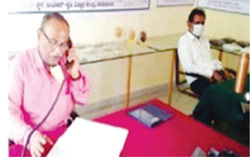 Vice-Chancellor consoling and suggesting
viable solutions to the query 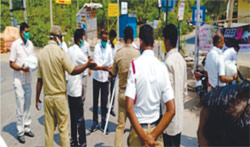 Encouraging Corona warriors (Police
Personnel) by quenching their thirst and exertion 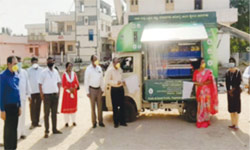 Vibal marketing awareness
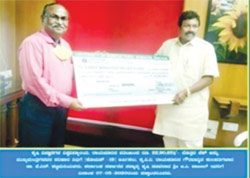 Young enterpreneur being awarded
|
|
The young entrepreneurs (85 Nos.) were made available with "Green Card" and helping them to convey and market the produce through their mobile vans by convincing District Administration.
Apart from helping farmers via“Agri War Room”, seven Krishi Vigyan Kendras and six Agricultural Extension Education Centres were also engaged in facilitating buyers for the farmers within their jurisdiction in marketing their agricultural produce. The Horticulture Club of the University initiated and bridged the gap between procurement and marketing of fruits and vegetables through linking buyers and consumers on established online platform.
The Teaching & Non-Teaching Associations of the University extended the moral support by providing fruits (watermelon) to Police Personnel of Raichur City, the warriors of COVID-19 . These Associations have shown their commitment in this epic fight and contributed their one-day salary amounting Rs2,290,651 (Rupees Twenty-two lakh ninety thousand six hundred fifty-one only) towards“Chief Minister’s Relief Fund [COVID-19]” and Vice-Chancellor, Dr K. N. Kattimani submitted the cheque on 7 May2020 to the Minister for Agriculture, Government of Karnataka.
Apart from these business activities, University with its capacity and its wider networks amongst farmers has been all along appealing to all citizens and farming community through electronic media including WhatsApp, Facebook and SMS platforms to adhere the mandatory and essential health care guidelines and tips.
|
|
